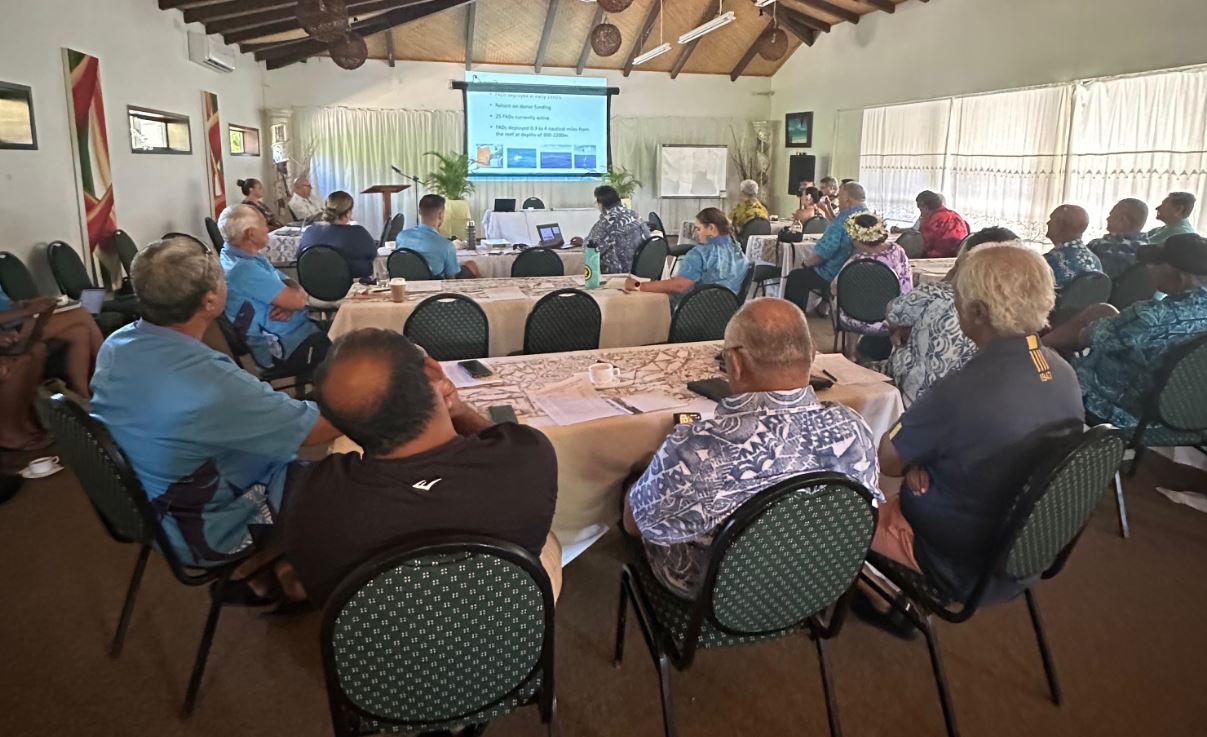Te Ipukarea Society: Biodegradable FADs and the purse seine fishery in the Cook Islands
Saturday 4 March 2023 | Written by Te Ipukarea Society | Published in Opinion

The tuna fisheries stakeholder consultation hosted by the Ministry of Marine Resources (MMR) was held at Crown Beach Resort. TIS/23030301
A one-day stakeholder consultation at the Crown Beach Resort in Rarotonga was held to discuss an upcoming project related to tuna fisheries in the region.
This Green Climate Fund (GCF) funded project is being developed, and this stakeholder consultation was to make sure relevant project activities are in line with the needs of the Cook Islands in regards to tuna fisheries.
Te Ipukarea Society attended the one-day workshop alongside individuals representing Ministry of Marine Resources (MMR), The Pacific Community (SPC), Conservation International (CI) as well as local fishermen including some from the outer islands.
The programme that is being developed is titled “Adapting tuna-dependent Pacific Island communities and economies to climate change”.
One of the topics discussed provided an opportunity for MMR to explain their sustainable FAD (fish aggregating device) programme.
Participants had the opportunity to express their thoughts on the proposed activities set out to increase access to tuna by expanding the use of nearshore and offshore FADS in our waters.
Te Ipukarea Society was able to raise issues related to materials used in FAD manufacture.
We have no concerns regarding anchored FADs that are being used to improve the fishing success for small scale fishers.
However, there are concerns regarding the drifting FADs (DFADS) used in purse seine fishery.
DFADs can harm endangered species such as turtles and sharks that sometimes become entangled in the attached aggregation materials, such as old netting.
They also attract a higher percentage of juvenile and bycatch species.
DFADs are usually made of synthetic and non-biodegradable materials that contribute to the increase of marine litter and other potential ecosystem impacts.
This is a particular area where we would like to see more progress to introduce non-entangling and biodegradable DFADs that will help to reduce the negative impact that this form of plastic pollution has on our oceans and marine life.
Most DFADs are constructed of synthetic materials that will take thousands of years to break down and are polluting the oceans.
Biodegradable fish aggregating devices (bio-FADs) can be made with natural materials like bamboo and cotton which will breakdown quickly and pose reduced risk to our marine life.
Alternative FAD design options that are biodegradable are still being considered by MMR.
Aspects such as the lifespan of a biodegradable DFAD material is something that the ministry is still looking into.
The Ministry of Marine Resources acknowledged the work and efforts of TIS in keeping the Ministry and community informed of any washed up DFADs they encounter and raising environmental awareness on the impacts that these have on our biodiversity and surrounding environments.
The impacts of abandoned DFADs remain significant, particularly on the uninhabited island of Suwarrow, our National Park.
While Te Ipukarea Society acknowledges that biodegradable non entangling DFADs are a vast improvement on those currently used, we still maintain that the purse seine fishery should not be using DFADs at all.
DFADS attract juvenile fish and other unwanted species that are caught by the purse seiners setting their nets on DFADs with location beacons.
These fish are at risk of being discarded as low value, despite regulations against discards, resulting in wasted resources that is important for Pacific Islanders.
These juvenile fish could grow into large, high value fish with a chance to breed if they were not caught as juveniles.
The purse seine fishery was once a free school fishery, or at worst setting their nets on drifting logs or whale carcasses floating in the ocean.
Though being less economical, this type of fishing was much more sustainable.
Today free school (non FAD) purse seine caught tuna is certified as sustainable, and marketed at a premium price because it is considered a sustainable fishery, as DFADs were not used.




















































